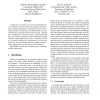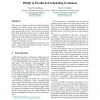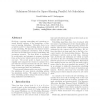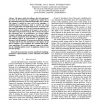100
click to vote
IPPS
2000
IEEE
15 years 6 months ago
2000
IEEE
In this paper we propose a new class of scheduling policies, dubbed Concurrent Gang, that combines the advantages of gang scheduling for communication and synchronization intensiv...
125
click to vote
JSSPP
2005
Springer
15 years 7 months ago
2005
Springer
Irregular and iterative I/O-intensive jobs need a different approach from parallel job schedulers. The focus in this case is not only the processing requirements anymore: memory, ...
104
click to vote
JSSPP
2005
Springer
15 years 7 months ago
2005
Springer
There are many choices to make when evaluating the performance of a complex system. In the context of parallel job scheduling, one must decide what workload to use and what measur...
116
click to vote
JSSPP
2005
Springer
15 years 7 months ago
2005
Springer
Sociology, computer networking and operations research provide evidence of the importance of fairness in queuing disciplines. Currently, there is no accepted model for characteriz...
118
click to vote
PPOPP
2006
ACM
15 years 8 months ago
2006
ACM
Most space-sharing parallel computers presently operated by high-performance computing centers use batch-queuing systems to manage processor allocation. In many cases, users wishi...
123
click to vote
IWNAS
2008
IEEE
15 years 8 months ago
2008
IEEE
We study parallel job scheduling, where each job may be scheduled on any number of available processors in a given parallel system. We propose a mathematical model to estimate a j...
105
click to vote
PDP
2009
IEEE
15 years 8 months ago
2009
IEEE
—this paper studies the influence that task placement may have on the performance of applications, mainly due to the relationship between communication locality and overhead. Thi...




